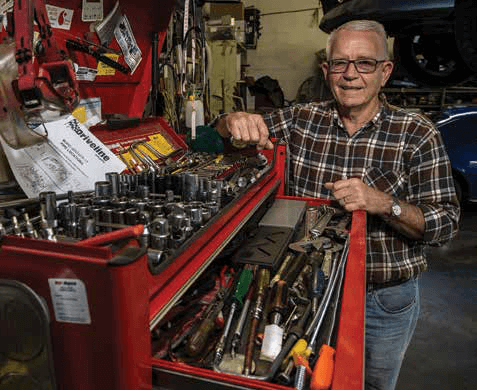From Australian Army mechanic in Vietnam to his own specialist transmission shop, Ron Hill is a man rich with expertise. Comparing a three-speed automatic gearbox of the 1960s to today’s nine- or ten-speed bamboozling electronic transmissions is fruitless. It’s as if they’re from different planets, despite having the same core function of automatically selecting gears so the driver doesn’t have to.
With over 50 years of mechanical expertise behind him – mostly specializing in auto transmissions – Ron Hill has witnessed the evolution first hand. “I look back to the three-speed auto days and they were absolutely nothing in terms of problems compared to today,” he said. “Gearboxes are fast becoming throwaway. It means the window of opportunity for auto gearbox repair has narrowed, as the cost is often more than the worth of the car after 10 years.”
Even so, with Australia seemingly intent on eradicating manual gearboxes from any new car sold these days, the expertise needed in maintaining and fixing auto transmissions should always exist Ron hopes. “The reliability of autos is better than it’s ever been,” he said. “If you could get 130,000km out of a Borg Warner in an XD Falcon that was considered a good run. Now cars will do twice that without a service. But when you do pull them apart it’s normally so expensive to fix that it’s not a proposition.”
Eloquent and cheery, Ron speaks like man content with his life’s work. His success has stemmed from working hard and intelligently, ensuring his skill level was bang up to date, and grasping opportunities as they arose.
Ron joined the army aged 17 and was tuning his and a mate’s Minis quite successfully. Pursuing this he was accepted as a mechanic’s apprentice. This was in 1965 when the Australian Army was losing mechanics to better paid jobs like truck driving, so Ron explained them: “condensed five years of apprenticeship into one year. I really enjoyed it and the knowledge just stuck there; I totally absorbed it.”
He worked on “soft skin” vehicles such as Land Rovers, trucks and trailers, and then branched out into armoured personnel carriers. He was posted to Vietnam as a mechanic, quickly being put in charge of an earth moving vehicle section. Once back in Australia, Ron decided to leave the army after some prompting from his wife, Dell.
“My father-in-law had put a seed in my brain that we follow the US market, and they’re all automatics so we’d go the same way,” Ron said. “In Brisbane at that time there were only two places that did automatics, so I did an International Correspondence School on autos to get the knowledge.”
Service station work and then a period with a partner working the Marooka Magic Mile of car yards in Brisbane followed, before Ron decided to set up on his own in 1975 at The Gap in Brisbane. “I had to borrow $4000 off my mother-in-law, sold my car and bought an old ute, hoist, gas welding set and transmission jack to go with my hand tools,” he said. “I built my own benches and got started.”
The business grew rapidly, and when Dell’s parents moved to the Sunshine Coast, Ron relocated his young family and operations to a new site in Maroochydore. “I borrowed $30,000, bought the land and put the shed up, which you could do back then for that sort of money,” he said. “I was a sole operator working on autos, but my father-in-law would come over, help pull the transmission apart and wash it which saved me a lot of work.”
Things got busier, Ron took on more staff (at its peak he had 12 staff) and extended the workshop into adjoining sheds. But the work changed significantly. “Back in the early days there was virtually no front-wheel drive,” Ron said. “About 99 per cent of work was Holden, Falcon and Valiant, with the odd British car, Datsun 180Bs and Sigmas, all basically three-speed automatics. I got so familiar with them I could almost work on them blindfolded.”
Ron got work from local car yards, cab companies, and took on more exotic brands like Mercedes and BMW (Saabs were hardest as their transmission was under the engine) and did trucks up to the Ford F-150. Ron Hill Automatics still exists today as a proud local business, but Ron sold it to colleague Bill Olah in 2008.
Since then Ron’s kept busy at his home workshop, doing jobs for old customers and hobby stuff, including work on his highly modified Chevy Camaro and Chevy Corvair. “I’ve got a little lathe, an original press and the same transmission jack I’ve had since 1975,” he said. “It keeps my mind active, and I can still diagnose problems with a three-speed auto easily; newer apprentices don’t get to work on them as they’re so rare today.”
Ron laments how the cost of a modern gearbox makes them so throwaway rather than repairable, and isn’t a fan of the modern lightweight CVT gearboxes. He’s not alone there. But he insists there’s a future. “The secret is a good understanding of modern systems, and diagnosis is key,” he said. “If you have a thirst for how things work and a passion, you have the edge when it comes to diagnosis. Not everything can be done with a diagnostic tool, and they can’t necessarily fix the car.”
Importantly, Ron said his workplace had a great culture and he enjoyed going to work each day. “I loved having a vehicle with a fault, diagnosing it, being proved correct and then driving it off fixed when you’d finished. You get a lot of satisfaction from that, and that’s the same today as it’s always been.”




